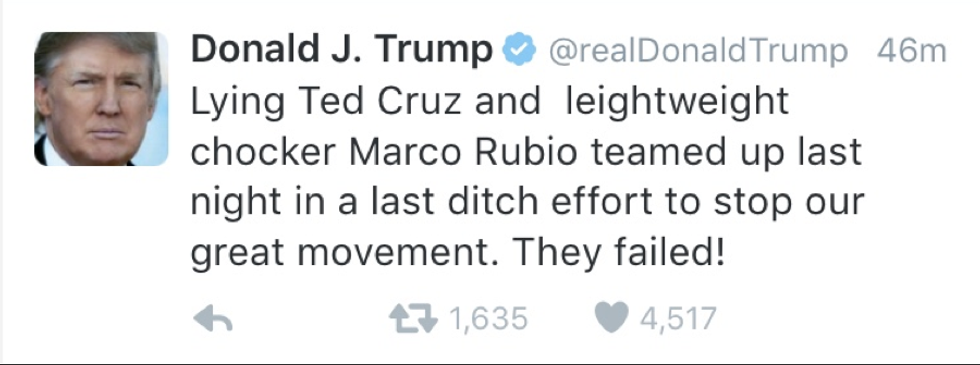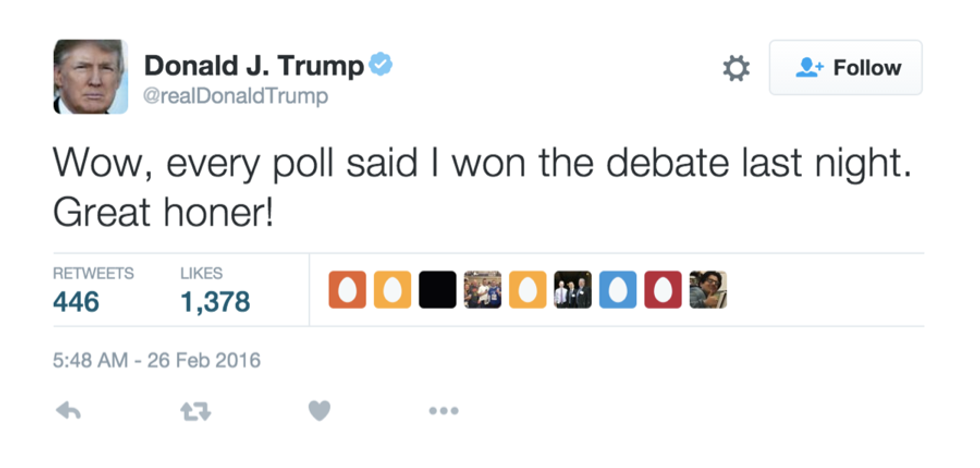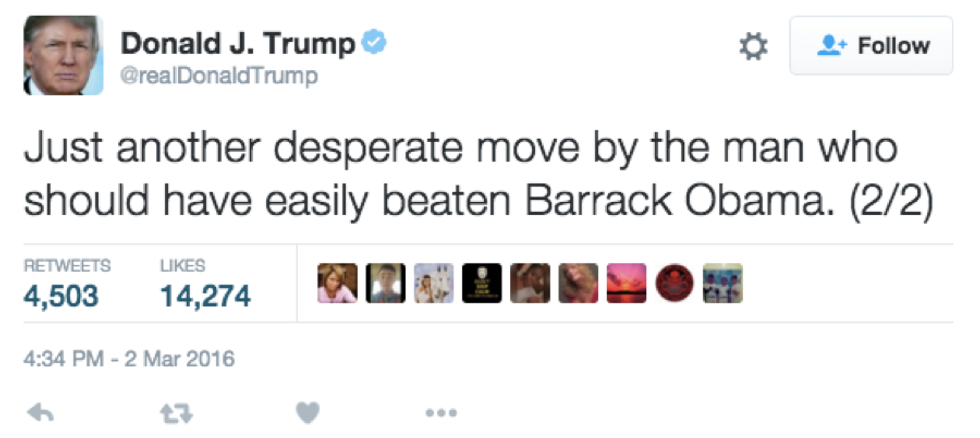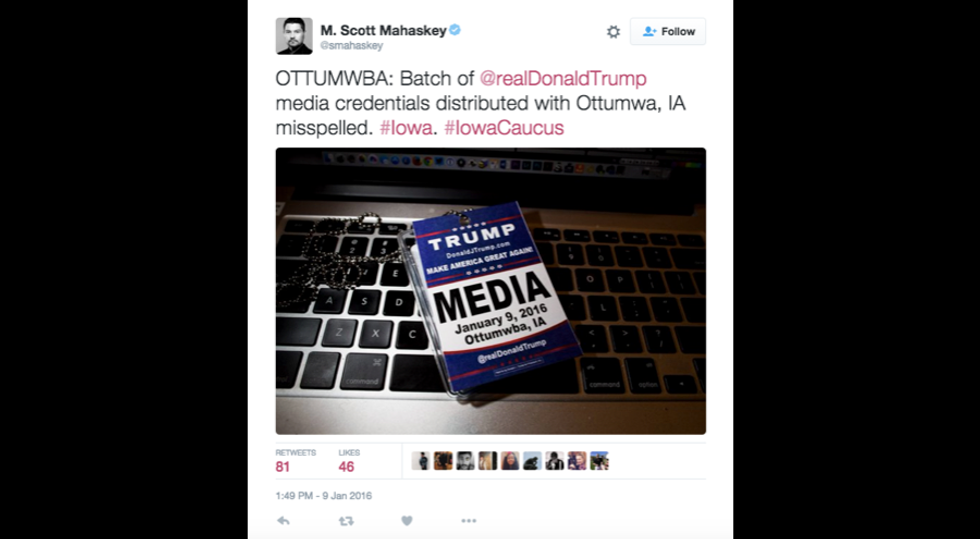We soon might be adding another man to the list of presidents who use improper grammar: Donald Trump.
It’s easy to argue that Trump doesn’t understand the sensitivity we all have to language—or maybe he’s more brilliant than all of us and recognizes something about what we subconsciously pick up on and what we don’t and this is why he’s succeeding in campaigning for the presidency. Either way, we can’t deny that his tweets have dozens of misspellings, grammatical errors and emphases on words and phrases that many of us, in his position, would not choose to highlight.
The rhetorical act of persuasion is a dominant aspect of politics, requiring those campaigning for a position such as the presidency to convince the majority of voters that their platform is the best upon which to stand. But allowing oneself to be persuaded into following the best path to civic success is hardly possible when the women and men who are promising to make America a better place to live are not demonstrating strong abilities to make amends between the general public and the proper grammar they must use in efforts to repair the country’s relationship with the forgotten societal heroes that are the liberal arts.
Many of Trump’s recent masterpieces on Twitter serve as beautiful examples of this flawed system. His misspellings of “lightweight” as “leightweight” and “choker” as “chocker” prompted the Trump nemesis about whom they were written, Marco Rubio, to address his tweets at a Dallas rally, refuting their validity and claiming that the repeated use of these inaccurate spellings only harmed Trump, as the public could hardly expect to take a man seriously who could not even really insult his opponent. While Rubio has his own flaws—as does every other candidate—at least he was able to identify the mistakes and how they might affect (or not) the attacker and the attackee’s reputations.
Furthermore, Trump has infamously misspelled “honor” to read “honer” and even botched the name of the current president. According to Indiana University, Bloomington psychologist Caitlin Fausey, “Past research shows that people pay more attention to negative events.” So, when politicians like Trump speak and compose this poorly, people will remember it just as much—if not more—than they remember great oral successes.
Twitter and other social media platforms have completely changed what is considered grammatically correct in the 21st century. We add new words like “selfie” and “autotune” to the official Oxford English Dictionary every year—proof that our language is constantly developing. This is great! More definitions of “accurate” language mean that we are adding to the database of tools we can use to communicate effectively. We are increasing the volume of words mutually understood, which is indicative of a healthy, growing society. For the most part, we are still all on the same page right now.
But still, it’s bizarre to think about our leaders not even spelling the names of other human beings or places they allegedly feel so passionately about correctly. Trump's campaign sloppily overlooked spelling the names of two out of the three recent cities in which he rallied correctly. Imagine: He wishes to earn the respect of the voters in each of these places, but proves that he does not care about them enough to ensure he knows exactly where he will be or enough about it to even spell it correctly. In the first months of 2016, his campaign messed up the spellings of Wichita, Kansas (spelled “Witchita”), Tulsa, Oklahoma (spelled “Tusla”), and Ottumwa, Iowa (spelled “Ottumbwa”). And more unfortunate than a simple mistake in the name of a few cities? Completely spelling the state name “Tennessee” wrong—as “Tennesee.”
As evidenced by the men who uttered the infamous “mistakes were made” line, Trump isn’t the only man making grammatical errors. This ignorance spans across parties, races, levels of power. And people aren’t taking well to it. Humans still intrinsically appreciate good grammar, even if we don’t all use it all the time, because it makes messages easier to understand and more relatable. If our nation’s leaders improperly use the English language, this value will eventually fall by the wayside, and schools will pay even less attention to grammar than they have been in the last 60 years (which is saying something).
This brings us back to the original ideas that the ancient Greeks had for advanced societies: that the liberal arts prepare us to properly perform our civic duty. America is a first-world country, and we have a responsibility to set a good example. So why are we ignoring the elements of education that are going to help us increase our intelligence and maintain or even elevate our stance in the world?
We’ve messed up. What we need to do is reprioritize and maybe stop talking so much until we understand what we’re going to say and how to say it and to whom. This change starts at the administrative level. Politicians need to speak (grammatically correctly!) with educators, who in turn must revive the liberal arts at every school. From there, we let the students establish a new, higher standard for grammar in particular so that we may advance STEM as a result of easily communicated critical thinking. Then, in a natural next step, we make scientific advancements as a result of our being able to approach a single situation in multiple ways. Such is the value of critical thinking. More time spent internalizing and analyzing thoughts produces more streamlined processes through multiple entry points.
The Queen’s English is the guiding format for proper language in the United Kingdom. Maybe eventually those of us in America will establish something like The President’s English. I’m not quite sure what that would mean for us in terms of earning the respect of other countries, but at least we’d then have a consistent means of communicating our political discussions internally.
In 1946, George Orwell opened his Politics and the English Languagewith a line that has not ceased being true: “Most people who bother with the matter at all would admit that the English language is in a bad way, but it is generally assumed that we cannot by conscious action do anything about it.” The current presidential election drama only supports this. The ones we elect to serve as those worth emulating on a broad scale are doing very little to enhance our maintenance of language. Education policies aside, if they themselves have difficulty adhering to the current rules of grammar, that’s enough indication that we must reevaluate the weight that the liberal arts hold in running a country. Public speaking and beautiful writing go hand in hand, easing the journey to successful competition in STEM. We want the rest of the world to take us seriously, but we’re going to need to earn that respect by communicating with some actual thought.











 mr and mrs potato head
StableDiffusion
mr and mrs potato head
StableDiffusion










